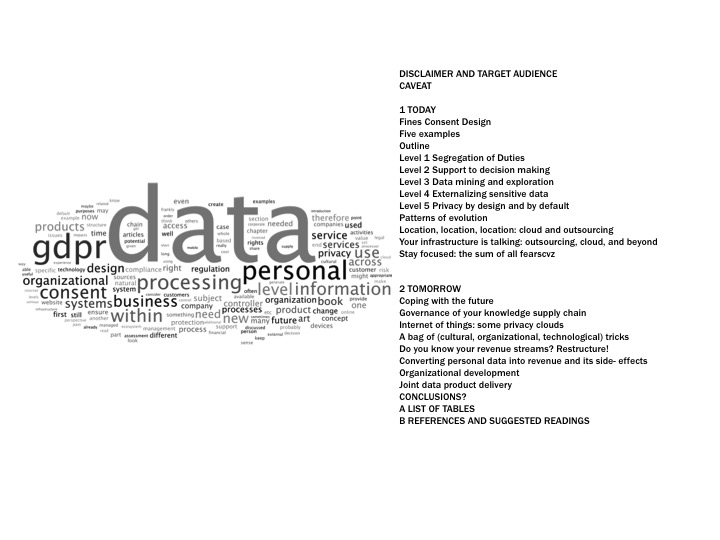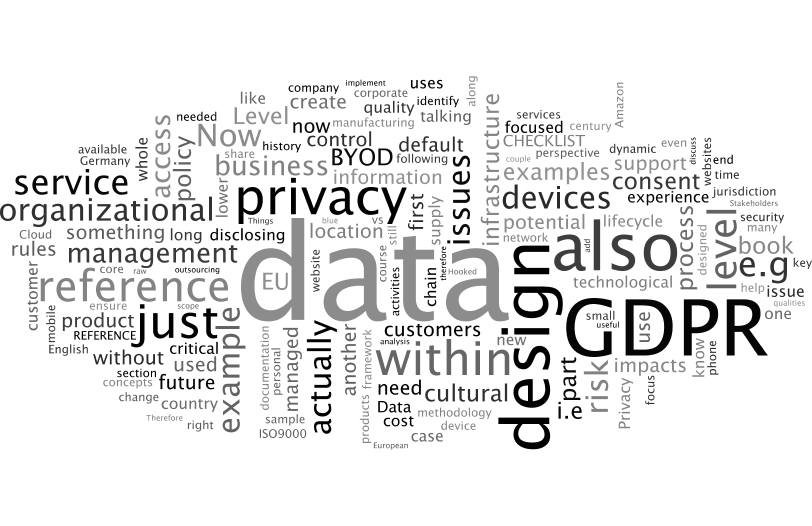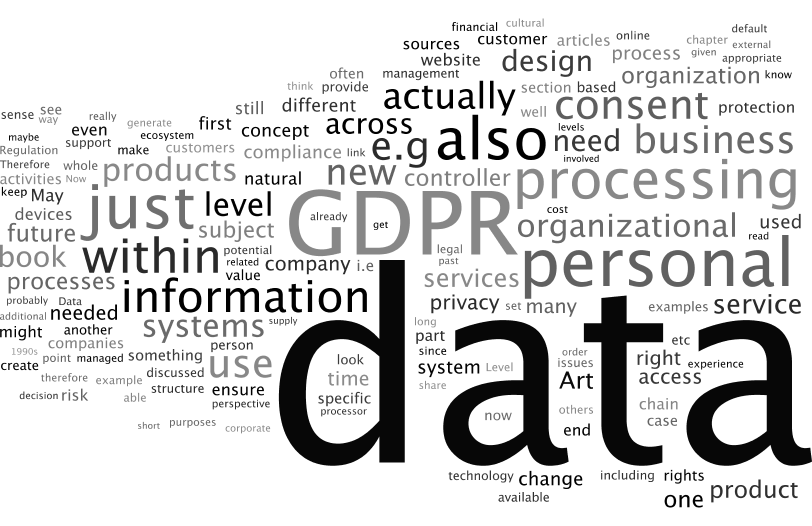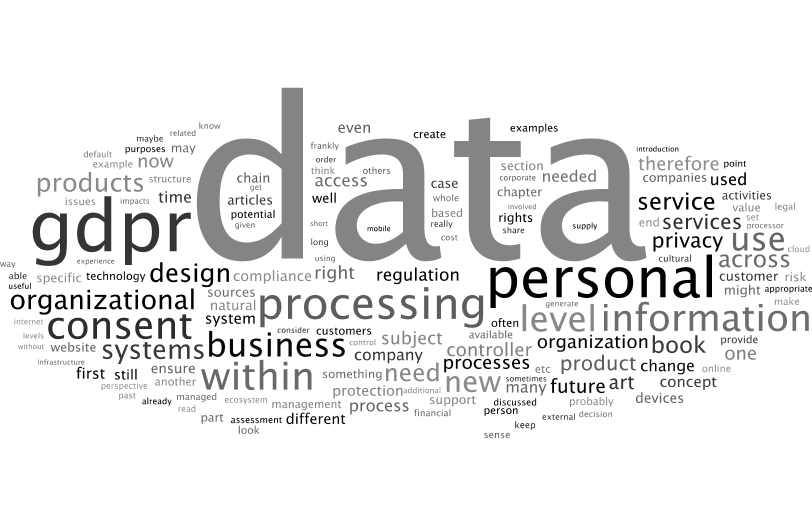Viewed 6645 times | words: 2118
Published on 2018-06-04 | Updated on 2019-12-07 16:59:26 | words: 2118
Yes, since yesterday my 10th mini-book (9th business mini-book) is available on Amazon.com (you can see links to the book and related material on robertolofaro.com/gdpr).
Title? "The Business Side of GDPR - cultural and organizational impacts".
As the title states, this article isn't just about this latest book, but about the overall concept, using the latest book as an example of what is to come.
Incidentally: it is the second book in the series "The Business Side of".
Let's start from the end- "The Business Side of GDPR".
INTRODUCTION: THE ENDPOINT- WHAT WAS PUBLISHED
As you can read within "Strumenti", a book on the integration of social media within political and advocacy marketing (published on 2014-11-30, you can read it online at robertolofaro.com/strumenti), you need to "layer" your communication strategy.
Yes, it is tempting to work on a "quick win basis"- but, unfortunately, this is a sure fire way to at best confuse your readers, at worst lose touch with your overall aim (and your own "ethos", "corporate identity", etc.)
Yes, you can and must adapt: but, frankly, also if you have in house "experts" on communication, check that they keep up-to-date and learn from others' experiences, otherwise they will just rehash forever what was old even before they completed their degree in communication.
And this is also a reason why I always try to add bibliographical references to cases or examples presented in my articles or books, and added the "publishing date" for each book (I usually review the bibliographical references no longer than a couple of weeks before publishing).
Sometimes I saw large amount of time (and, probably, money) spent on advertisement whose only purpose was to celebrate the "creative agency" that had prepared the material, and allow them to win yet another prize, than to reinforce a brand, attract/retain customers and partners, or any other corporate purpose of their customer.
"The Business Side of GDPR" was designed as a follow-up and expansion on a book that I released in January 2014, on BYOD (Bring Your Own Device, e.g. when you use your personal smartphone for business uses).
This picture summarizes the book content:

Anyway, if you want to know more about the book before buying it... on Friday I will release on Slideshare.net/robertolofaro as usual few slides building on this picture.
Of course, I bought the first copies (as well as an additional few copies of my "change" notebook, for shared projects).
Now, an instant book it wasn't, as actually I had planned to write it long, long ago, but simply had to wait the end of my latest mission to get at writing it.
Why? Due to the subject, I did not want any potential misunderstanding or conflict of interest, and as in Spring 2016 I was ready to leave that mission as it wasn't what agree to nine months before, and I was explicitly told that there was no way it would ever turn- but then, decided to stay for personal reasons.
Eventually, once I started on something, I kept staying until December 2017, but then it stretched into February 2018.
In the end, having to wait had a positive side-effect on the book.
Because, since Spring 2016, there have been actually few explanatory notes that clarified some points, some decisions applying the previous Data Protection Directive that paved the way to GDPR enactment from May 25 2018, and... scandals such as Cambridge Analytica and other misuses of personal data.
As you can read within the book, those highly visible cases actually turned a technical discussion into a mainstream issue, and increased citizens' and businesses' awareness.
With some quixotic results- as frankly most of the GDPR update reminders that I received either were unnecessary if you had bothered to read it, or... violating GDPR.
Such as the penchant for pre-selected values on forms online: it is "privacy by default", not "consent by default", that is required by GDPR.
Even more curious the choice of some companies that actually split data between European and non-European, but "forgot" to delete from non-European mailing lists EU citizens, resulting in being spammed and your personal data being retained outside GDPR-jurisdiction, but with no possibility to invoke rights to amend or "be forgotten".
I doubt that European watchdogs will actually "forgive" companies adopting that trick.
In the next section, I will outline how the book content developed.
WRITING IN A GLASS BOX
In my past activities, I had often to prepare 10-20-50 pages documents as "briefs" or "groundwork" for projects, to prepare for negotiations, or as recommendations for organizational or technological changes, also after auditing a contract or project.
Sometimes the documents were much longer- but, frankly, in business I always split documents in segments, as many do not even read emails longer than five paragraphs.
Over the last few months, for various reasons I had constant direct and indirect interactions with observers.
Therefore, while my previous book ("change") was really a week-end exercise, for GDPR decided to work as in those "open kitchen" restaurants.
The aim: show the whole process, and share the progress online, while also discussing the threads and various versions of the table of contents with others.
As a professor at LSE told us when I attended a Summer School in International Political Economy... don't ask what's inside the sausages that you are eating: there are many wrong alleys or dead ends also when you are using as a background an existing document or, in the case of GDPR, regulation.
Why? Because you have to decide not just the structure (that was set by the series the book belonged to), but also depth, length, general narrative, and therefore you end up selecting much more background material and creating much more "connecting the dots" material than you really need.
I read many 300+pages business books that could have been easily 100-150 pages shorter without losing any value.
And an American colleague who introduced me to many readings advised me to read on HBR essays and articles on forthcoming books and... skip the book, as many business books go on and on and on- again, just filling pages to justify the price tag.
In my case, it was funny, as I did not have that much time, and, frankly, mainly I had to refresh and find new bibliographical references and articles to quote.
But you can actually see here how the content developed, as I started posting a tag cloud on the book page when I was midway through the writing process (it took a couple of months).
On May 21st:

On May 23rd:

On May 31st:

And, finally, on June 3rd:

THE CONCEPT ABOUT EACH BOOK SERIES
On http://robertolofaro.com/book/business-books you can find books sometimes listed as belonging to a series.
The first book that I published in 2013 was the result of an experiment, as isn't technically a "business book"- just what Berlin inspired me in two weeks in November 2012.
I started posting on my frype.com/robertolofaro/blog right before my travel to Berlin, and stated that, whenever there were at least 50 readers, a new post would go online.
Eventually, it became a daily post, and sometimes, to keep my word, I had to... post more than once a day- the joy of "gamification" (and being a boring "promise keeper" by inclination).
From that, derived a book, that you can read for free on slideshare.net/robertolofaro (or buy on Amazon), #BerlinDiaries (it has also its own Facebook page, facebook.com/BerlinDiaries, to be focused on EU news).
Now, that experiment defined the format.
The original intent was simpler- in 2012, after a short contract, I had decided to create mini-books to use as "groundwork" for workshops and seminars.
The idea: if each mini-book is just 50-100 pages, and just 6x9, it can be easily kept in a jacket pocket, and used as a notebook to scribble notes, and maybe some pages with bullet lists, tables, etc can be photocopied and used as "draft" for something more specific to the task at end.
As since the late 1980s I worked across Europe almost exclusively by word-of-mouth, but since 2008 this generated mainly... positive externalities (i.e. benefits to third parties).
What should the books be?
1. Short: around 50 and no more than 100 pages
2. Cheap: never more than 10 USD / EUR / GBP - the aim isn't to get rich by writing mini-books, but to spread ideas, awareness, and obviously visibility
3. Depending on the series, a different style of content-delivery:
a. For "The Business Side of", policy/compliance-oriented
b. For "Connecting the Dots", taking on a theme and considering consequences, with a more open-ended discussion
4. Some books (e.g. "Strumenti", "Business Social Networking", "Knowledge-based Organizational Change") would instead be focused on various aspects of digital transformation
5. And, of course, there could be "out of series", such as "Change", an I-Ching-based notepad on change management
Then, I adopted a different cover style for each series- it was a work in progress since 2013, but eventually decide to set on something that would make each book look more like a notepad than a book.
In my career, my "designed case studies" ranged from business to technical to social to compliance, to just... creative- it was really a function of purpose and... budget.
As an example of a more extended case study, you can have a look at "#QuPlan - A Quantum of Planning": short book, few hundred pages of case studies, written as a "script" (the last episode is due later this month).
CONCLUSIONS
What is behind each book is always a theme, a mindmap defining the signposts through that theme and potential venues to explore, followed by plenty of collection of details, bibliographical references and, of course, re-checking what I experienced and know.
Because whatever you did, whatever you know... must be re-checked before sharing with somebody that maybe will not interact again with you (i.e. an audience), as you will not be able to do as consultant sometimes have to do "by the way, as for X and Y, there is an update/amendment/improvement/new trend".
Doesn't matter how often you did something, whenever I prepared a workshop or training or material to be spread, I went through it again to the best of my abilities- re-reading and re-searching current references.
It is easy, but... it is 99% perspiration and 1% inspiration.
What's next?
My main industries are listed on my CV.
In preparation of something else, I am re-reading and re-searching across the main industries I worked on since 1986, plus of course regulatory and compliance issues.
Stay tuned, and have a nice week.
 _
_